
|
Senso (1954, It.) (aka The
Wanton Countess)
In director Luchino Visconti's 3-Strip Technicolored
historical period fantasy and melodrama about an illicit, destructive
and ill-fated romance, with lush sets and costuming; its historical
context was the 1860s - a time of Italian independence and unification
known as Il Risorgimento; for US audiences, the lavish Italian
production was recut (truncated to 94 minutes), rewritten (by Tennessee
Williams and Paul Bowles), luridly renamed as "The Wanton Countess,"
re-dubbed and re-released:
- the film's setting was during the brief
war between Italy (and Prussia) against the Austrian Empire
in the summer of 1866, as explained in the film's opening title
card: "Venice, Spring of 1866, the last months of the Austrian
Occupation of the Veneto. The Italian government has formed a pact
with Prussia, and the war of liberation is imminent"
- the film opened in the Austrian-occupied city of
Venice, in a scene set in La Fenice Opera House half-way through
a performance of Giuseppe Verdi's four-act opera Il Trovatore ('The
Troubadour'); just before the intermission break of the
opulent grand opera, a troubador sang the
final line of the aria: "To arms!"
- a major disturbance - a political demonstration
(considered sedition by the Austrians) broke out inside the Opera
House due to Italian Nationalists stirring up protest in the audience;
pro-independence leaflets with the tri-colors of the Italian flag
- red, green, and white - and bouquets of tri-colored flowers wrapped
with similar ribbons, were tossed and floated down from the
balconies and upper levels onto the opera-house's best orchestra
seats on the ground-floor; the protest was to express
dissatisfaction with the presence of the white-uniformed officers of the occupying-Austrian troops ("Foreigners
out of Venice" -
one woman shouted)
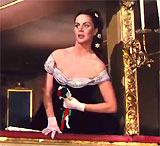
Countess Livia Serpieri (Alida Valli)
|
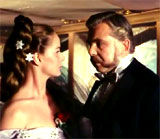
Countess Livia With Her Older Husband Count Serpieri
(Heinz Moog)
|

Livia's Cousin - Roberto Ussoni (Massimo Girotti)
- The Underground Resistance Leader
|
- observing the melee from her opera box was the
unhappily-married, well-educated and proud Italian aristocrat,
Countess Livia Serpieri (Alida Valli); she was married to older
businessman Count Serpieri (Heinz Moog) - a self-interested collaborator
who presently was courting favor with the Austrians; she
was a fervent nationalist and also very independent-minded
- as she herself told her husband: "You know I do whatever I wish"
- with voice-over narration, the Countess described
the worrying situation: "It all began that evening. It was the 27th
of May. My cousin Roberto Ussoni, one of the organizers of the
demonstration, was also a leader in the underground movement in
Venice..."; she had watched as a shouting match of offending
insults had broken out on the floor of the opera house between
her radical, freedom-fighting cousin Marchese Roberto
Ussoni (Massimo Girotti), the leader of the
Resistance who had organized the protest, and handsome,
young, vain and dashing adventurer - Austrian Lieutenant Franz
Mahler (Farley Granger)
- the passionate and patriotic
Countess feared for her cousin's life (when she heard from him
that a duel-challenge was set
for the next morning), but she also struggled
to keep it a secret that the very noble Ussoni was her favorite
cousin; the conniving Countess sought out the Lieutenant -
her first words to him in Austrian General Hauptmann's (Cristoforo
De Hartungen) opera box were illuminating - "Do
you have a good view?" - as the Lieutenant peered at her low
decolletege
- speaking through the director, she criticized the
soap-opera nature of the film's actual plot and its characters:
"I dislike people behaving like characters in some melodrama with
no regard for the serious consequences of a gesture dictated by
impulse or by unforgivable thoughtlessness"; then she boldly appealed
for the Austrian Lieutenant to disregard the duel-challenge with
her most-admired cousin to save himself (but actually to save her
relative); she was told that the Lieutenant had already planned on arresting
Ussoni; shortly later, it was confirmed to her that Roberto (along
with many of his compatriots) were arrested and exiled for one
year
- almost by accident soon after during a late night
curfew in the city, she had another encounter with the
womanizing, seductive Lieutenant and reluctantly agreed to allow
him to accompany her during a nocturnal stroll and tour of
the city's deserted back streets and canals until the early morning
hours; she was immediately smitten by him and struck
up an ultimately-treacherous, indiscreet friendship and romance
with him in the Venice/Verona area
- the Countess recklessly betrayed her husband by remaining with the Lieutenant
in a sordid and secretive relationship that soon became public knowledge;
they often met in a room for sex that she had rented in the Old
Quarter of Venice; by giving herself over to their promiscuous
affair and living only for the present moment: ("There's only now.
Only now, Franz. There is no tomorrow"), she soon realized that
she had lost control of her feelings
|
The Countess' Not Very Secretive Love Affair
|
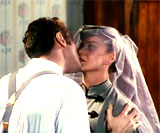
Their First Kiss
|
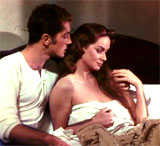
In a Rented Room Together
|
- at the same time, she was blinded to the Lieutenant's
real flawed and opportunistic, womanizing nature; he had already
revealed himself to be materialistic and very vain: ("I like to
look at myself..."); his shallow objective in joining the Army,
as he later explained, was to show off his impressive military
uniform: ("We like the uniforms that flatter
our manly figure...the postures and attitudes of heroes"); and
it was implied that the uncommitted, unworthy, manipulative cad
and cheap phony was exploiting her while also entertaining other
lady friends
- desperate to see him after he suddenly disappeared
for a few days, she became paranoid, agonized and unreasonably
jealous, and frantically searched for him throughout the city; heartbroken,
she returned to her husband's house in Venice, which was being evacuated
after the battle reached the city; after Livia learned of the Lieutenant's
whereabouts in a new military camp, she told her house-maid Laura
(Rina Morelli) to openly tell her husband the truth about where she
was going: "Whatever you like! It doesn't matter. I don't care what
you say, understand? Go on, spy on me! Tell him everything!"; she
also directly revealed to the Count that she had an adulterous lover:
"I don't want to keep on lying. Yes, I have a lover. I love him.
I want to live with him, you understand?"
- at the same time, after Roberto returned from exile
and crossed the border into Italy with other rebel partisans and
was hiding out at the Count's home in Venice, the Count announced
his sudden change of allegiances to Roberto - he was now backing
the Italians against the Austrians
- Livia was forced to flee from the city for safety
to her husband's palazzo in the countryside of Aldeno;
Franz risked following the Contessa there and snuck into her bedroom
from the balcony after evading the estate's guards and dogs; she
was unreasonably convinced of his sincere love for her after he
heard that she had fled from Venice, when he vowed: "...all I could
think of was how to see you again....Why else would a man risk
his life to come here?...I only want to look at you, be with you";
it was entirely possibly that after war had been declared, the
cowardly Lieutenant was fleeing from open conflict

|

|

|
|
The Countess Awakened by Franz Entering Her Bedroom
at the Count's Country Villa
|
- although Livia was heartened by his declaration
of love, she realized that they were no longer living a fantasy
in Venice; she also felt that she had betrayed
her country's revolutionary cause of independence and her highest
ideals during their forbidden affair: ("You made me forget every
shred of decency and dignity for a wretched and illicit love that
brought nothing but shame"); but then after ordering him to go, she
began to rekindle their relationship and they
presumably made love (off-screen); he was still in her bedroom
as dawn broke, and she sympathetically helped him to stay and evade
capture for one more day by hiding him in her husband's granary
- the unprincipled Franz - using false pretenses
- betrayed the Contessa, by asking for much of her money (funds
that she had saved to support the "cause" of the Italian
partisan rebels including her cousin Roberto, to fight the Austrians);
the cowardly Lieutenant claimed that he could bribe a military
doctor to certify him as unfit for duty so that he wouldn't have
to go into battle; instead, he could live a quiet civilian life
and be "a free man"
- after he had convinced her of the barbarity and
irrationality of war, she decided to agree to the "contemptible
act" (his description); with tears in her eyes welling up and great
conflict in her mind ("I have gone mad!"), she gave up most of
her fortune of over 3,000 florins earlier promised to her cousin;
incredibly callous, he told her: "It would feel wrong
not to take it," and then confessed to his own despicable
nature: "I can't live like this. You shouldn't love me. Nobody
should"
- she ignored the world-changing events
surrounding her, and jeopardized the cause of her own country,
as she admitted: "For his sake, I'd forsaken and betrayed everything
for which the others were so desperately fighting, those dreams
which they had struggled so long to make reality"; as a result
of her betrayal, the partisans were massacred and forced to retreat
- as battles were being fought in the region during
the war, the Contessa became anxious when she was unable to see
the Lieutenant or receive further communications; eventually, a
letter arrived from Verona, thanking her for her financial support
that effectively provided him with an exemption from the home-front;
ignoring the Lieutenant's specific directions to stay where she
was, the Countess risked a dangerous coach ride to Verona through
the war zone to see him
- in the film's remarkable conclusion, the two shallow and self-interested
lovers suffered an appropriate fate
- she surprised the gold-digger Franz in a rented
apartment that she had financed for him; he scolded her harshly: "You
shouldn't have come. You were wrong to come, and you'll be sorry
you did." He was
no longer an "officer" or a "gentleman" - he
called himself a "drunken
deserter - and I stink to high heaven of cowardice and vice";
he obviously didn't want the Countess there and treated her abusively;
the unfaithful and hedonistic Franz introduced her to his young
tart-prostitute Clara (Marcella Mariani), and noted: "I pay
her with your money"; he crassly and insultingly called the
Countess his "wealthy
patroness" who wasn't much better than the hired streetwalker;
he claimed that she thought like he did - that love could be purchased:
("Otherwise you wouldn't have given me money to buy yourself
an hour of love"); he had enough of her love for him and yelled: "I'm
not your romantic hero! And I don't love you anymore"

|

|

|
|
The Countess Confronted by the Lieutenant's Young
Prostitute ("Tart")
|
- after becoming distraught by the vicious revelations
of the Lieutenant, she was thrown out as he shouted at her: ("Run, run, you trollop!
Get out of here!") - she was crying hysterically as she staggered
away; the cuckolded and abandoned Contessa wandered in the streets
and walked through groups of drunken Austrian soldiers
- [Note: Italian censors at the time demanded a reshooting of the film's
original ending in which she was taunted and sexually-abused by
Austrian soldiers, was rendered immobile, and was driven mad.]
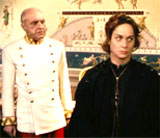
Presenting Franz' Letter to an Austrian General
|
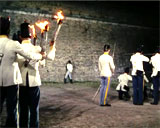
Franz Executed by a Firing Squad
|
- in a new alternative, added-on ending, the humiliated
and vengeful Contessa decided to find moral redress by betraying
Franz (evidenced by his written letter) to a General in the Austrian
Army. Afterwards, she was left all alone to cry out
Franz' name as she staggered away. Franz was seized
from the residence and immediately sentenced to be executed
by a firing squad for treasonous and dishonest desertion from
the battlefield
|
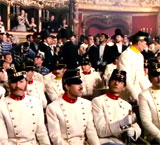
White Uniformed Austrian Soldiers in Orchestra Seats of the
Venice Opera House

Tri-Colored Leaflets and Bouquets of Flowers Tossed From the Opera's Balconies
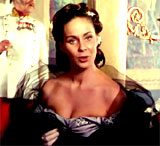
Countess Livia Serpieri
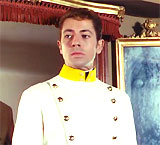
Lieutenant Franz Mahler (Farley Granger)
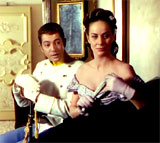
In the Opera House, the Countess Asked the Lieutenant: "Do you have
a good view?"
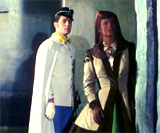
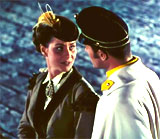
During a Nocturnal Stroll With the Lieutenant Through Venice's Streets After
Curfew
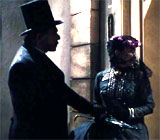
The Countess Revealing Her Affair to Her Husband, the Count
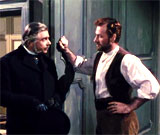
The Count's Change of Allegiances to Support the Partisans, Led by Livia's
Cousin Roberto

The Count's Country Villa in Aldeno
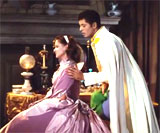
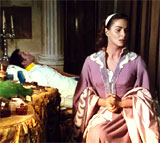
The Countess' Sudden Realization of Her Ill-Advised Affair With the Lieutenant
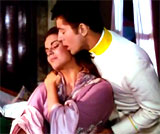
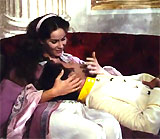
Rekindling the Relationship Until Dawn
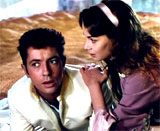
The Lieutenant's Request to Livia for Funds to Bribe a Doctor So That He
Could Avoid Military Service
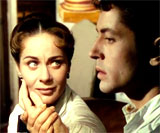
The Countess Agreeing to Give Much of Her Fortune to the Lieutenant
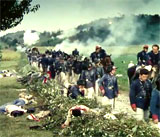
The Italian Partisans Massacred and in Retreat
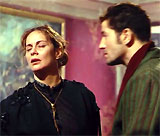
The Countess Distraught After Being Cheated and Betrayed by "Drunken Deserter"
Franz
|



















